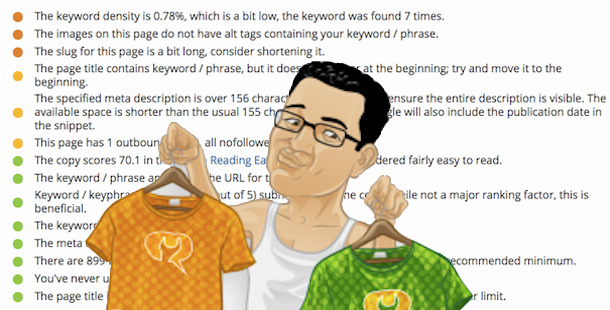Readers of this blog know that I’m big on Yoast SEO for optimizing your website. It’s a great tool to control the meta data that Google uses to index your site – and a whole lot more.
Yoast is perhaps the most widely used SEO plugin, having been downloaded 14,202,540 times. I’ve written about the on-page keyword optimization tool as well as the off-page settings and have spoken about using Yoast at Meetups.
Read: Using WordPress SEO by Yoast and Getting the Most from Yoast: SEO Settings Tour
The plugin has much to offer other than optimization, but at this point in a post-Penguin Google update world, it’s time to rethink the use of that page tool.
The Yoast page tool has a gaming aspect that can be fun (or frustrating) to use. You work and rework your text until you get all the bullet points in the Page analysis to turn green.
At the sight of those green bullet you pump your fists in the air, claim triumph, and log out with the conviction that your post is going to rank super high for your keyword. Yeah, baby!
But er, that’s not quite the reality in a post-Penguin world. Google is not the same as when Yoast created his plugin. You may think that achieving Yoast’s green bullet status is the pinnacle of page optimization, but it’s not necessarily so.
In some cases, that green bullet may deliver lower results on Google by indicating you are trying too hard to rank.
Worse, achieve a green bullet impels you make your post jump through all kinds of unnatural hoops that may affect the quality of the content.
It doesn’t have to be that way. Yoast is not God. Pleasing his plugin is not your ticket to search paradise. Yoast is merely a tool that allows you to work with your metadata to help Google read it.
Here are some examples of when the orange is the new green bullet in Yoast SEO.
Post Title and SEO title differ
In a post-Penguin world, Google is smart enough to understand synonyms and syntax better than ever. Google now uses Latent Symantec Indexing or LSI, which is:
“an indexing and retrieval method that uses a mathematical technique called singular value decomposition (SVD) to identify patterns in the relationships between the terms and concepts contained in an unstructured collection of text.”
This means that when Google crawls your site it will look for synonyms related to the H1 tag of your page, which is the title.
So when you use the keyword phrase, “WordPress themes” in your post title, try using “themes for web design” or “WordPress templates” in your SEO Title – or vice versa – because Google will understand them as being related.
Remember that the SEO Title is the one that follows your post around in social media.
Focus keyword can vary
Yoast typically wants you to use your keyword (phrase) in a ratio of 1% in the content. To get a green bullet on Yoast’s analysis, you need to use the verbatim keyword ten times in a 1000 word post. That’s with no grammatical variation such as pluralities or apostrophes. Who can write that way?
With LSI, though, you don’t need to repeat the same keyword (phrase) over and over within the content. Here’s what Nile from Yoast told me in an email:
“The page analysis tool is merely a guide in order for your content to be seen more favorably by Google search. You don’t have to have everything perfect. Keywords don’t have to be exactly in order.”
So try using more synonyms and related terms instead of piling on the keyword phrase.
Focus keywords don’t make great openings
Yoast’s Analysis page always demands that you place your keyword in the front of your article title. Being in the title is not enough; he wants the first word to be your focus keyword! Who would write a headline that begins with the subject like that?
![]()
Don’t do it! It’s a trap! Don’t screw up your perfectly good writing in order to achieve that green bullet. Orange is the new green bullet.
Page builders don’t get analyzed
If you use a page builder like Thrive Themes, Yoast won’t analyze your page without a special filter. You need to take what you learned about using Yoast and apply it manually. Setting the Focus Keyword, SEO Title, and Description can be done in the Classic page view and will work for Google.
Yoast also does not like pages with shortcodes, and if you don’t have a couple hundreds words around the shortcode, you’ll get the orange bullet. That’s because the page doesn’t meet the top criteria of containing at least 300 words. Just give the page a keyword-rich SEO Title and Description and live with it.
Read the Definitive Guide to Yoast, updated September 14th
Yoast SEO is just a tool
These are just a few of the Yoast rules that were made to break. In the end, Yoast will not in and of itself make your optimization better. It’s just a tool to help you organize your keywords and be a better blogger. It’s up to you use best practices, whatever tool you use.
What did I miss? Are there any other instances in which it’s better not to follow Yoast’s advice to the letter?
Shameless Self-Promotion
I’ll be at WordCamp Las Vegas, Sunday, September 20 at 1:15 pm, talking about this very topic.
My session is Taking Control of Search Optimization with WP SEO by Yoast. I’ll need to talk fast to cover it all in 40 minutes, but do drop in if you’re there. Afterward, we’ll go to the Elvis museum. Viva Las Vegas!

